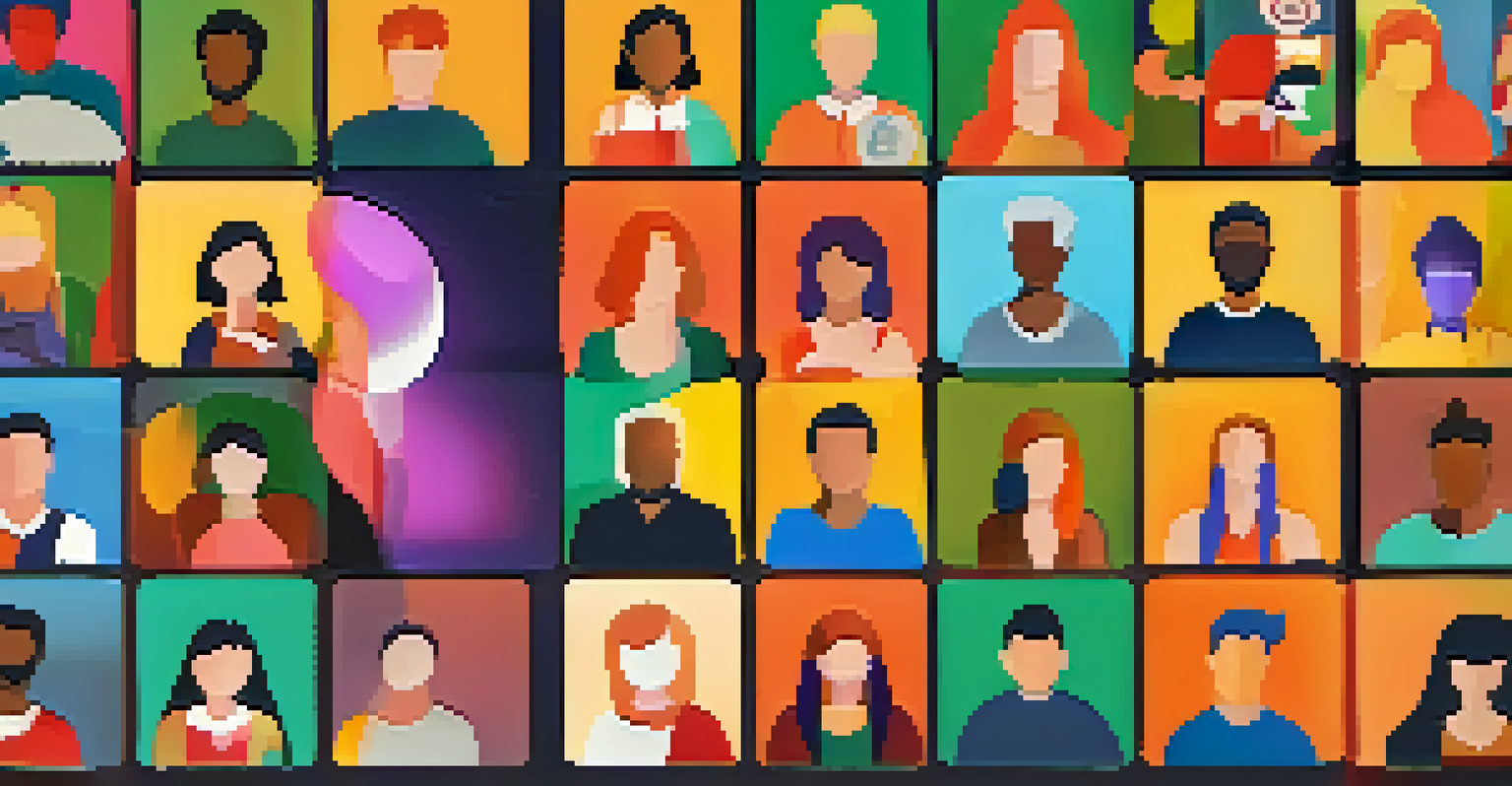Digital Citizenship: Responsibilities in a Connected World

What Is Digital Citizenship and Why It Matters
Digital citizenship refers to the responsible use of technology and the internet. In a world where our lives are increasingly intertwined with digital platforms, understanding digital citizenship is crucial. It's not just about using devices; it's about how we interact with others and navigate the vast online landscape.
The internet is becoming the town square for the global village of tomorrow.
With the rise of social media and online communication, we have a responsibility to engage respectfully and ethically. This means recognizing the impact of our words and actions on others and understanding the potential consequences of our online behavior. Our digital footprint is permanent, and being a good digital citizen helps ensure that footprint is a positive one.
As we embrace the digital age, fostering a sense of digital citizenship can lead to a more informed and respectful online community. By promoting positive interactions and understanding our responsibilities, we can create safer spaces for everyone to connect and share.
The Importance of Online Privacy and Security
In today's connected world, protecting our online privacy is more important than ever. With data breaches and identity theft on the rise, being aware of how to safeguard personal information is a key aspect of digital citizenship. This involves using strong passwords, enabling two-factor authentication, and being cautious about the information we share.

Understanding privacy settings on social media platforms is also essential for maintaining control over our online presence. By adjusting these settings, we can limit who sees our posts and personal details. It’s a small but significant step toward protecting our privacy and maintaining our digital integrity.
Understanding Digital Citizenship
Digital citizenship involves using technology responsibly and engaging respectfully in online interactions.
Moreover, educating ourselves about the risks associated with online activities empowers us to make smarter choices. Staying informed about current threats helps us navigate the internet more safely, ensuring that our digital experiences are secure and enjoyable.
Respecting Others: The Foundation of Digital Etiquette
Digital etiquette, or 'netiquette', is about treating others with respect and kindness online. Just as we would in face-to-face interactions, it’s crucial to communicate thoughtfully and consider the feelings of others. This includes avoiding hurtful comments, being mindful of tone, and acknowledging diverse perspectives.
In the age of information, ignorance is a choice.
Engaging in constructive conversations can lead to richer exchanges and foster a more inclusive online environment. Practicing empathy in our digital interactions not only reflects our character but also encourages others to do the same. Remember, a simple act of kindness can go a long way in creating a positive online community.
Additionally, being aware of how our online behavior affects others can help us build a culture of respect. By promoting understanding and compassion in our digital interactions, we contribute to a healthier online atmosphere where everyone feels valued.
The Role of Critical Thinking in Digital Citizenship
In an era where information is abundant, critical thinking is an essential skill for digital citizens. With the rise of misinformation and fake news, the ability to evaluate sources and discern fact from fiction is more important than ever. This skill allows us to make informed decisions about the content we consume and share.
Engaging critically with information means asking questions: Who created this content? What is their intent? Are there credible sources backing this information? By analyzing content through this lens, we can develop a deeper understanding of the world around us and avoid spreading false information.
Protecting Online Privacy
Maintaining online privacy and security is essential for safeguarding personal information in today's digital landscape.
Encouraging critical thinking not only enhances our own digital literacy but also fosters a more informed community. When we approach information thoughtfully, we help combat misinformation and promote a culture of accuracy and accountability in our online interactions.
The Impact of Social Media on Digital Citizenship
Social media platforms have revolutionized how we communicate, but they also come with unique responsibilities. As digital citizens, we must navigate these platforms thoughtfully, considering how our posts and shares can impact others. It's a powerful tool, and with that power comes the obligation to use it wisely.
Being aware of the effects of our online presence can help us engage positively on social media. This includes being cautious about what we share, avoiding spreading rumors, and being respectful in discussions. Our actions can influence our followers and shape the online environment, so it's essential to be mindful.
Additionally, social media can be a force for good when used to uplift others and share valuable information. By leveraging these platforms to promote positivity and understanding, we can contribute to a more supportive digital community.
Engaging in Online Communities Responsibly
Participating in online communities can be a rewarding experience, but it also requires a sense of responsibility. Whether it's joining forums, commenting on blogs, or engaging in social media groups, being a good digital citizen means contributing positively and upholding community standards. Each interaction shapes the community and sets the tone for future discussions.
Being respectful and constructive in our contributions fosters an inclusive environment where diverse voices can be heard. This entails being open to differing opinions, avoiding hostility, and focusing on collaboration rather than conflict. When we approach online communities with a spirit of cooperation, we enrich the collective experience.
Critical Thinking is Key
Developing critical thinking skills helps digital citizens evaluate information and combat misinformation effectively.
Moreover, taking the time to support others in these communities can lead to lasting connections. Whether it's offering help, sharing resources, or simply encouraging fellow members, our engagement can create a vibrant and supportive online atmosphere.
The Future of Digital Citizenship: Challenges and Opportunities
As technology continues to evolve, so does the concept of digital citizenship. New platforms and tools bring exciting opportunities for connection and creativity, but they also present challenges that require our attention. Adapting to these changes and understanding our responsibilities will be vital in shaping the future of online interaction.
Emerging technologies, like artificial intelligence and virtual reality, will redefine our online experiences and interactions. With these advancements come ethical considerations—how do we ensure that technology serves humanity in a positive way? Engaging in discussions about these issues will be crucial as digital citizens.

Ultimately, embracing a proactive approach to digital citizenship can help us navigate the complexities of our connected world. By fostering a culture of responsibility, respect, and critical thinking, we can ensure that our digital future is bright and inclusive for all.